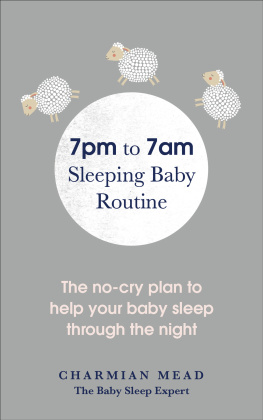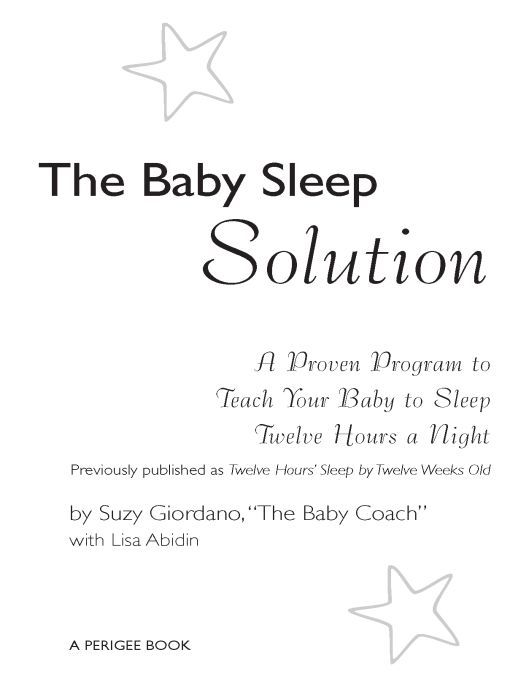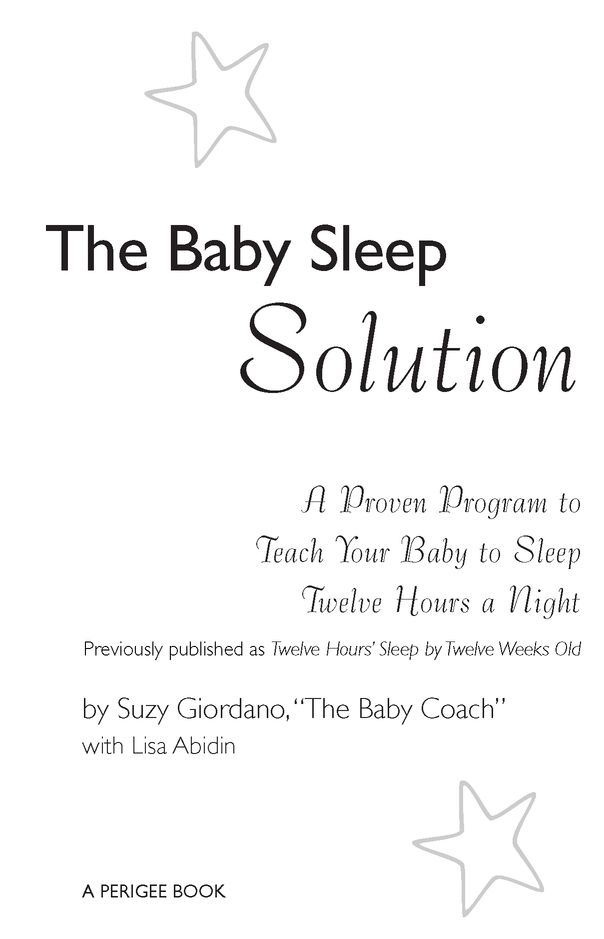Table of Contents
To my children, Camilla, Bruno, Marcella, Thiago, and Matheus, who have taught me all the lessons that have led to this book. It is an honor to be called your mother. For the love, understanding, and a great journey I thank you!
Suzy Giordano
For my children, Lauren, Michael Jr., and Christian, and my husband, Michael Sr. Without all of you, this book would not exist. I love you always.
Lisa Abidin
Foreword
You better get some sleep! Haunting words tossed out at soon-to-be parents. Lisa and I heard it many times, especially since we were expecting twins. We were lucky enough to have help at night and we were lucky enough to meet Suzy.
I heard Suzy and Lisa talk endlessly about raising babies. Very early on, I heard the claim of twelve hours sleep by twelve weeks for twins, even less for singletons. Suzy casually mentioned the possibility of writing a book and I immediately jumped on the idea. She returned the next night to find a tape recorder, dictation machine, and laptop computer. Between Suzy and Lisa, the perfect marriage for a book was made. Suzy brought her wisdom of the ancients, raw empiricism, and bountiful common sense and blended it with Lisas own recent experience training our babies using Suzys methods and her ability to craft the concepts into a step-by-step cookbook type text.
As a medical doctor, I searched the common sources to ensure that our babies would receive enough nutrition from their feedings to sustain and maintain growth. The Merck manual reports that an infant should receive 50-55 kcal per pound per day. The method employed herein requires that the child weigh at least nine pounds and consume at least 24 ounces of formula or breast milk a day. Twenty-four ounces of standard formula provides a volume of 720 ml at a concentration of 0.67 kcal per ounce, or a total of 482.4 kcal. This divided by nine pounds equals 53.3 kcal per pound, and is right in line with the Merck recommendation. I was struck by the homology involved as it became apparent that Suzy had worked out the perfect amount of nutrition needed to sleep through the night by trial and error. It also made me wonder if those who worked out the weights and measures in earlier times also stumbled upon this measurement; 1 ounce per hour. As the child grows, the amount of food is increased and other foods are later introduced in order to meet the increasing nutritional demands of the child. Children do thrive under this plan, as borne out by Suzys years of experience. Medicine has shown that children release growth hormones during sleep, and, therefore, sleep plays an important part in childhood growth.
In short, the plan works. Children are content. Parents are happy. The household is a calmer and more nurturing environment.
I am delighted to have had a small part in something I feel will add so much to the lives of parents and their children.
Michael Abidin, M.D.
Introduction
My Background
By the time I was twenty-six years old I had five children, the youngest being fraternal twin boys. When my twins were born, I had an eight-year-old daughter, a seven-year-old son, and a two-year-old daughter. At that point in my life, I had no idea I would one day be a Baby Coach. I was as overwhelmed as you might imagine anyone would be. I am originally from Brazil, and the culture there is very different from that in the U.S. when it comes to bearing the responsibilities of raising children. Moms and aunts do not come for the first three weeks to help out while women recover from delivery. Most husbands have never changed a single diaper in their lives, much less stayed awake to help with nighttime feedings. Cloth diapers were the norm, and there was no outside company to pick up and deliver them fresh and clean to your home. To add insult to injury, there was also no washing machine or dryer. Wives cooked homemade meals from scratch at least three times a day. And by scratch, I mean no Leggo my Eggo, no Wonder bread, no Newmans Own.
The first weeks of my life after my twins were born went something like this: I tried to breastfeed them every two hours, but I had very little milk coming in (about ounce per feeding). In addition, I was changing 14-20 diapers a day (well, really 56-80 diapers if you count the fact that each child wore four cloth diapers at a time. Cloth diapers are much thinner in Brazil than they are here), hand-washing them in my kitchen sink, and hanging them on a line to dry outside or oftentimes draped around the bathroom, since it rains a lot in Brazil. I was also cleaning the twins clothes, as well as my two-year-olds, my seven-year-olds, my eight-year-olds, my husbands, and mine. All by hand, all without a dryer. I was also preparing three full meals a day, completely from scratch, for five people as well as doing the normal day-to-day housekeeping.
Catering to the needs of seven people with about 45 minutes of sleep each night lasted about three weeks. I arrived desperate at my parents home one morning at 5:00 AM. My dad said he would watch the twins for a couple of hours so I could get some sleep. I went to bed only to wake again to the crowing rooster, but found the sun was still not up. I thought I must have drifted off for about 15 minutes, but could not go back to sleep, so I went out to check on the twins. There was my dad feeding them bottled formula. I said, Oh, I couldnt sleep, so you can hand them over to me. My dad looked puzzled, and then said, Suzy, what do you mean? I have been feeding them all day and all night. You have been asleep for 24 hours.
At that point my dad sat me down and told me, You cannot go on living like this, you have to develop a plan. And on that day I did develop a plan, a plan that my twins were still following when I emigrated from Brazil to Virginia in 1990. My twins were a year old, and a friend of a friend, Sarah, who had six-month-old triplets, came to visit one night. She gazed in jaw-dropping glory as she watched my twins with blankies in hand kiss us good night and start crawling up the stairs to their beds. She asked how long they had been going to bed so easily, and I told her since they were about three months old. At this point she asked if I could help her do the same with her triplets.
Sarahs life at home had become chaotic. She went from a home that consisted of her, her husband, and three pets to adding four day nannies, three night nannies, an au pair, a housekeeper and, most importantly, three babies (two girls and one boy) who were up all night. There were three different shifts of workers, working seven days a week, 24 hours a day. Needless to say, Sarah and her husband were finding it difficult to transition from their quiet DINK (Double Income No Kids) lifestyle to the literal three-ring circus their life had become.















